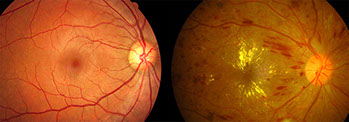Diabetes and Eye
Diabetic retinopathy is a disease that occurs when diabetes damages the vascular structure in the retina. The liquid part of the blood in the vessel can leak out and as the disease progresses, abnormal new vessel formations occur on the surface of the retina. We see that retinopathy usually affects both eyes together.
Diabetic retinopathy has four stages: mild, moderate, severe and proliferative.
Blood vessels damaged as a result of diabetic retinopathy cause vision loss in two ways:
- Easily bleeding, abnormal blood vessels may develop and their bleeding into the eye may cause blurred vision
- The fluid part of the blood may leak from the damaged blood vessel walls due to diabetes into the center of the macula (yellow dot), where sharp and central vision occurs. The leaked fluid causes swelling in the macula and blurred vision. This condition is called macular edema. Therefore, it is beneficial for everyone with diabetes to have a comprehensive fundus examination with dilated pupils at least once a year.
Diabetic retinopathy can be a problem for diabetic pregnant women during pregnancy. In order to protect vision, it is beneficial for all diabetic pregnant women to have a detailed fundus examination as soon as possible. Your doctor may request additional tests during pregnancy.


Studies conducted on diabetic patients show that good blood sugar control slows down the onset and progression of retinopathy. Diabetic patients who can keep their blood sugar as close to normal as possible also have less kidney and nerve disease.
Some other studies have shown that the risk of vision loss can be reduced by correcting high blood pressure and cholesterol levels. Correcting these will help protect your vision and is also important for your general health.
Prevention of Diabetic Retinopathy:
The best way to prevent the progression of diabetic retinopathy is regular, comprehensive eye examinations. It may be recommended that diabetics have an eye examination at least once a year. Patients with more advanced retinopathy may need to be monitored more frequently. Patients who experience blurred vision should report it to their doctor immediately.
In addition to regular eye exams, the most important thing to prevent vision loss is to keep blood sugar under control. Three finger insulin tests per day can reduce the progression of diabetic retinopathy by 76%, according to the Diabetes Complication Control Trial.

